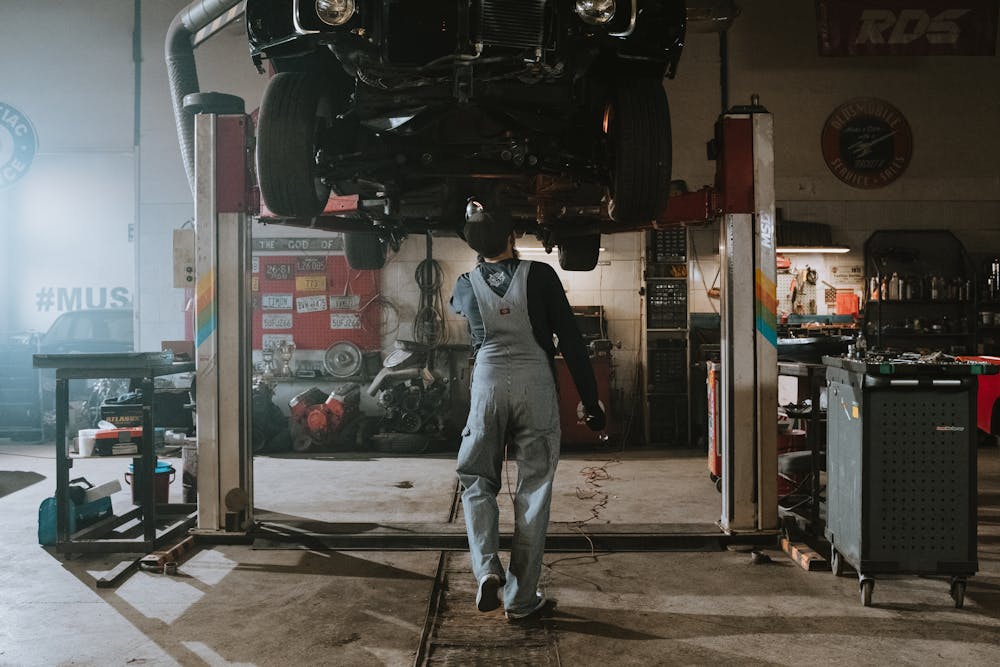Engine Diagnostics & Repair in East Redding, CA
As we explore the topic of engine diagnostics and repair in East Redding, CA, it’s imperative to take into account the pivotal role of advanced diagnostic tools and skilled mechanics in detecting and resolving common engine issues. These professionals guarantee that vehicles are not only safe and efficient but also have a longer lifespan. But how exactly do they conduct these diagnostic tests? What are the most frequently encountered engine problems in East Redding? And, what preventive measures can be taken to avoid these issues and maintain engine health? Stay tuned as we navigate through these intricacies.

Key Takeaways
- ‘East Redding Auto Repair’, ‘Redding Engine Specialists’, and ‘EastSide Mechanics’ are top-rated shops for engine diagnostics and repair in East Redding, CA.
- These shops offer advanced diagnostic services using tools like oscilloscopes and OBD-II scanners to identify engine abnormalities and issues.
- Regular maintenance and preventive measures, like oil changes and filter replacements, are prioritized in these shops to ensure engine longevity.
- The repair shops have highly skilled mechanics who can handle minor to major engine problems, from overheating to worn spark plugs.
- High customer reviews for these shops reflect their quality service, professionalism, and reliability in providing thorough engine diagnostics and repairs.
Understanding Engine Diagnostics
The domain of engine diagnostics is a critical facet of automotive maintenance that demands attention and understanding. This intricate process entails a thorough analysis of an engine’s performance, employing advanced diagnostic tools designed to identify and rectify potential issues before they escalate into significant problems.
Engine diagnostics consists of monitoring and testing various engine components, including the fuel injectors, ignition coils, and air intake system. This is done using advanced diagnostic tools, such as oscilloscopes, code readers, and scan tools, which provide real-time data on engine performance. This data is then analyzed, and the results guide the subsequent repair process, ensuring efficient engine performance.
The importance of engine diagnostics cannot be overstated. Regular diagnostic checks can help detect minor issues early, preventing them from causing severe damage to the engine or other vehicle components. It can also improve fuel efficiency, reduce emissions, and enhance overall vehicle performance. Furthermore, conducting engine diagnostics can help extend the lifespan of the engine, saving vehicle owners costly repair or replacement fees in the future.
Common Engine Problems
While engine diagnostics can identify a wide range of issues, there are several common engine problems that every vehicle owner should be aware of. These issues can greatly impact engine performance and fuel efficiency if not addressed promptly and adequately.
One prevalent issue is the overheating of engines. This can be caused by numerous factors such as a malfunctioning cooling system or a defective thermostat. Overheating can lead to severe engine damage if not rectified promptly.
Another common engine problem is oil leaks, which can result in dramatic reductions in engine performance. Oil lubricates the engine, reduces friction, and keeps it cool. An oil leak could lead to a lack of lubrication and overheating, causing considerable damage to the engine components.
Issues with the fuel system can also impact fuel efficiency and engine performance. Dirty fuel injectors or a defective fuel pump can lead to poor fuel-air mixture, causing the engine to run inefficiently.
Lastly, worn out spark plugs are a common issue that can cause the engine to misfire, reducing power and fuel efficiency. Regular maintenance is vital to prevent these common issues and maintain the best performance of your vehicle’s engine.
The Importance of Regular Checks
Regularly checking your vehicle’s engine is crucial for its ideal performance and longevity. Regular checks, using advanced diagnostic tools, allow for the early detection of potential issues that, if left unaddressed, could lead to considerable engine damage. These checks are not just about preventing breakdowns; they’re also about optimizing engine performance and fuel efficiency.
Routine engine inspections typically involve examining the engine’s various components and systems, using diagnostic tools to identify any abnormalities. These tools provide valuable data that can help predict potential problems before they escalate. Regular checks can also identify areas that may need adjustments to enhance engine performance.
Preventive maintenance is another crucial aspect of regular checks. This includes activities such as oil changes, filter replacements, and other tasks that help to maintain your engine’s health. By regularly replacing worn-out parts and ensuring the correct functioning of critical systems, you can greatly prolong the life of your engine.
Diagnosing Engine Issues
In the domain of auto maintenance, diagnosing engine issues is a critical skill. Proper diagnostics can prevent minor issues from escalating into major problems, preserving both the functionality and longevity of the vehicle. A thorough understanding of engine performance is paramount to accurately identify abnormalities or degradation.
Diagnostic tools play an indispensable role in this process. They are used to read and interpret data from the vehicle’s onboard computer system, providing invaluable insights into the engine. For instance, OBD-II scanners can retrieve diagnostic trouble codes (DTCs), which help in pinpointing specific malfunctioning components within the engine. Other tools like multimeters and test lights are used to diagnose electrical issues that might be affecting the engine’s performance.
Moreover, a visual inspection of the engine can also reveal tell-tale signs of problems. Unusual wear, leaks, or corrosion can indicate underlying issues that need to be addressed promptly. Similarly, listening to the engine can provide clues about its health. Unusual noises like knocks, pings or excessive idling can suggest problems with the engine’s performance, which require immediate attention.
Top Repair Shops in East Redding
Finding your way through the maze of auto repair shops can be a challenging task, particularly when your vehicle desperately needs engine diagnostics and repair services. In East Redding, CA, a number of auto repair shops standout for their superior repair services and exceptional customer reviews.
One such shop is ‘East Redding Auto Repair’, revered for its advanced diagnostic capabilities and seasoned mechanics that specialize in intricate engine repair services. The shop’s diligent attention to detail has garnered consistent, positive customer reviews. ‘Redding Engine Specialists’ is another shop that prides itself on its technical expertise and commitment to customer satisfaction. Their repair services are thorough, covering everything from minor tune-ups to complex engine overhauls.
Lastly, ‘EastSide Mechanics’ has a reputation for being a reliable, go-to repair shop in East Redding. They offer a full range of repair services, specializing in engine diagnostics and repairs. Their high online customer reviews are an indication of their quality, professionalism, and reliability.
These shops represent the best that East Redding has to offer in engine diagnostics and repair services. When you choose any of these shops, you’re assured of a professional, detail-oriented, and technical approach to your vehicle’s needs.
Preventive Measures for Engine Longevity
To guarantee the longevity of your vehicle’s engine, adopting preventive measures is of utmost importance. Regular maintenance and careful attention to your vehicle’s engine can greatly extend its lifespan, ensuring ideal performance and minimizing costly breakdowns.
One vital aspect of engine maintenance is routine oil changes and filter replacements. High-quality oil lubricates the engine’s moving parts, reducing friction and heat, whereas clean filters prevent harmful debris from entering the engine.
Maintaining the cooling system is another essential task. A well-functioning cooling system prevents the engine from overheating, preserving its components and maximizing fuel efficiency.
Fuel quality should not be overlooked either. High-quality fuel can improve engine performance and longevity, while poor-quality fuel can lead to engine damage over time.
Moreover, consider your driving habits. Aggressive acceleration and braking can strain the engine, leading to premature wear and tear.
- Regular oil changes and filter replacements
- Maintenance of the cooling system
- Consideration of fuel quality and driving habits
Adhering to your vehicle’s recommended maintenance schedule, incorporating performance upgrades like engine tuning when necessary, and frequently monitoring your engine’s health can make a considerable difference in its longevity. These preventive measures, although seemingly minor, can contribute greatly to your vehicle’s engine longevity.
